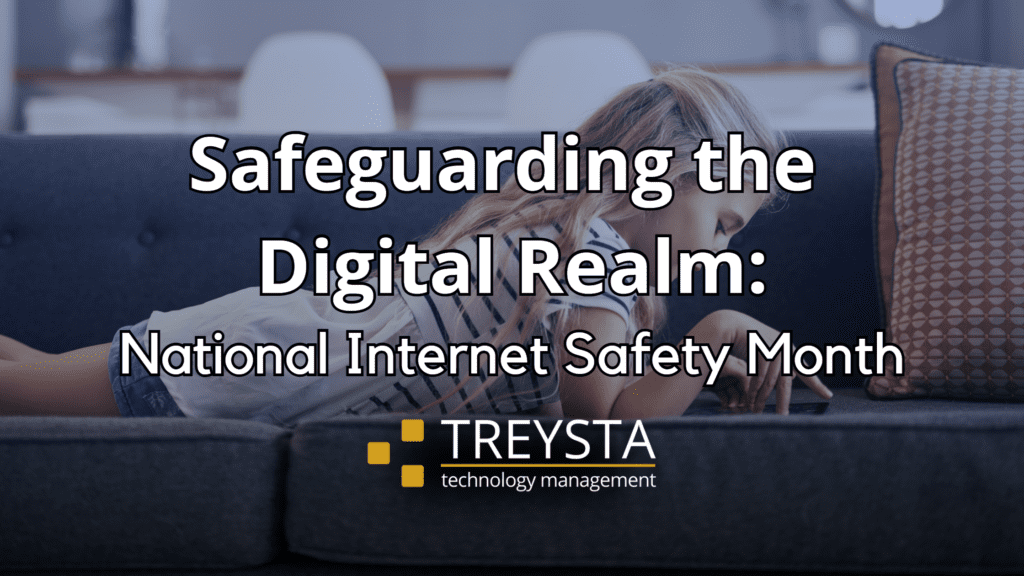The internet has become an integral part of our lives, connecting people across the globe and providing an abundance of information and opportunities. However, as we embrace the countless benefits of the digital age, it is crucial to prioritize online safety and security. National Internet Safety Month serves as a timely reminder for individuals, families, and communities to take proactive steps towards protecting themselves and others in the virtual world.
National Internet Safety Month serves as a reminder to take proactive steps towards protecting yourself and others in the virtual world.
Each of us plays a part in ensuring proper cyber safety across the entire world wide web.
What is National Internet Safety Month?
[/et_pb_text][et_pb_divider _builder_version=”4.11.3″ _module_preset=”default” global_colors_info=”{}”][/et_pb_divider][et_pb_text quote_border_color=”#E09900″ _builder_version=”4.11.3″ _module_preset=”default” global_colors_info=”{}”]
National Internet Safety Month began in June of 2005 and is a dedicated cyber-educational period. The need for online safety, especially among children and teens, was passed as a resolution by the U.S. Senate to bring awareness to this growing issue. As the school year comes to a close, children will be spending more time online. In fact, they may average over 7 hours a day during the summer! Because of this, they could be more vulnerable to cyberbullying, cyber predators, and phishing attacks.
During the summer, kids may spend over 7 hours a day online.
The goal of National Internet Safety Month is to promote online safety and responsible digital citizenship. It serves as a platform for organizations, educational institutions, and individuals to engage in discussions, workshops, and initiatives that promote safe internet usage. This month-long campaign aims to empower individuals with the knowledge and tools necessary to navigate the online landscape securely.
Why Online Safety Matters
The internet offers a wealth of opportunities, ranging from education and entertainment to communication and commerce. However, it also presents numerous risks, as we mentioned previously: cyberbullying, identity theft, phishing scams, and exposure to inappropriate content. Ensuring online safety is crucial for protecting personal information, safeguarding mental wellbeing, and fostering a healthy digital environment for all.
Ensuring online safety is crucial for protecting mental wellbeing.
In an era where technology is deeply embedded in every aspect of our lives, it is essential to cultivate a culture of responsible technology use among children and teens. Cybersecurity education provides an opportunity to instill values of digital citizenship, ethics, and responsible behavior. Teaching children about the potential consequences of cyberbullying, the importance of respecting privacy, and the significance of protecting their personal information empowers them to become responsible digital citizens and future leaders in the digital era.
59% of U.S. teens have experienced at least one form of online harassment.
Unfortunately, there are several negative statistics when it comes to children and teens using the internet. Mental wellbeing is crucial for children and teens as it significantly impacts their overall development, academic performance, relationships, and future success. Here are some eye-opening facts regarding their internet usage:
- Cyberbullying:
According to a study by the National Institutes of Health, approximately 15% to 35% of young people have experienced cyberbullying at some point in their lives. Cyberbullying can lead to increased rates of depression, anxiety, and low self-esteem among children.
- Online Harassment:
A survey conducted by the Pew Research Center found that 59% of U.S. teens have experienced at least one form of online harassment. This includes offensive name-calling, spreading false rumors, physical threats, or explicit images being shared without consent.
- Social Media and Mental Health:
Research published in JAMA Pediatrics suggests that there is a correlation between heavy social media use and an increased risk of mental health issues in adolescents. Excessive time spent on social media platforms can contribute to feelings of loneliness, depression, poor body image, and decreased self-esteem.
- Internet Addiction:
While not exclusively a mental health statistic, internet addiction can significantly impact a child’s overall wellbeing. Studies have shown that excessive internet use, including gaming and social media, can lead to increased rates of depression, anxiety, social isolation, and poor academic performance.
It’s important to note that these statistics reflect general trends and individual experiences may vary. However, they highlight the potential mental health challenges that children may face in relation to their internet usage. It is crucial for parents, educators, and caregivers to be aware of these issues and take proactive measures to promote healthy internet habits and provide support for children’s mental wellbeing.
10 Key Practices for a Safer Online Experience
Ensuring a safer online experience involves implementing key practices that prioritize personal security and protect against potential threats. Below, are 10 ways you and your family can stay safe online.
- Educate Yourself and Others:
Stay informed about the latest online threats, scams, and privacy settings. Encourage open conversations about online safety with friends, family, and especially children. Teach them about responsible internet usage, the importance of not sharing personal information, and how to identify and report suspicious online behavior.
- Strengthen Passwords:
Create strong, unique passwords for each online account. Use a combination of upper and lowercase letters, numbers, and symbols. Consider using a reputable password manager to securely store and manage your passwords.
- Be Mindful of Privacy Settings:
Review and adjust privacy settings on social media platforms, apps, and websites to control who can access your personal information. Limit the amount of personal information you share online, such as your address, phone number, and birthdate.
- Exercise Caution with Personal Information:
Be cautious when sharing personal information online, especially on public platforms. Think twice before posting sensitive details or photos that could be used maliciously or compromise your privacy.
- Be Wary of Suspicious Links and Emails:
Exercise caution when clicking on links or opening attachments in emails, particularly if they come from unfamiliar sources. Verify the sender’s authenticity before sharing any personal or financial information.
- Practice Safe Social Media Usage:
Be mindful of the content you post on social media. Avoid sharing excessive personal details and consider limiting your friend/follower lists to trusted individuals. Regularly review your online presence to ensure your digital footprint remains secure.
- Stay Updated with Security Measures:
Keep your devices, operating systems, and applications up to date with the latest security patches and updates. Enable automatic updates whenever possible to ensure you have the latest security features.
- Utilize Antivirus and Firewall Software:
Install reputable antivirus and firewall software on your devices to detect and prevent malware and other cyber threats. Regularly scan your systems for any potential security risks.
- Encourage Kindness and Respect Online:
Promote positive online behavior by fostering a culture of respect, empathy, and kindness. Report and discourage cyberbullying, harassment, hate speech, and any other forms of inappropriate online behavior.
- Seek Help and Report Incidents:
If you encounter cyberbullying, scams, or any form of online harassment or abuse, report it to the appropriate authorities and platforms. Reach out to trusted individuals for support and guidance.
Conclusion

National Internet Safety Month serves as a vital reminder to prioritize online safety and security. By adopting responsible digital practices and spreading awareness, we can create a safer and more inclusive online environment for everyone. Let’s empower ourselves and others to make informed decisions and protect our digital wellbeing as we navigate the ever-evolving digital landscape.
These resources will help you understand emerging threats, learn best practices for protecting you and your family, and develop the necessary skills to navigate the online world securely. Take the initiative to invest in your cybersecurity education and empower yourself to stay one step ahead of cyber threats.
Resources:
https://www.stopthinkconnect.org/
Balancing Your Children’s Privacy Online (Video)
The Tech Talk: Talking to Your Kids About Online Safety (Video)





